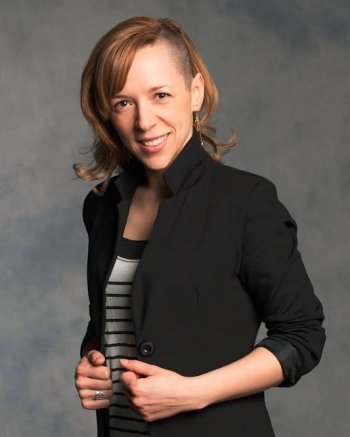Twenty-five years ago, Tony Kushner’s Angels in America took the theatre world by storm. Now considered one of the seminal works of the 20th century, the play went on to win the Pulitzer Prize for Drama and dominated the Tony Awards two years running. Vancouver audiences will have two opportunities to see the first half of this contemporary masterpiece in celebration of its quarter-century.
I think it is an important play to still be doing and a conversation to have even as AIDS doesn’t have the same threat it used to. The fight against AIDS in the play is emblematic of other fights that are happening now. – Rachel Peake
The first production comes as the season opener for Studio 58, the professional theatre training program at Vancouver’s Langara College.
Remembering its emotional impact
Under the direction of Studio 58 alumna Rachel Peake, the play was chosen by Peake when she was asked to return to her alma mater by artistic director Kathryn Shaw.
The first professional show Peake saw when she began her studies at the University of Alberta in Edmonton has stayed with her over the years. Peake not only saw the play’s anniversary as reason enough to bring it to Studio 58, but it is also a play that holds a special place for her.
“It had such an emotional impact on me as to what theatre was and could be,” says Peake. “I have a real interest in contemporary classics, and it remains one of my favourite plays.”
Complex and layered
Complex and layered, Angels in America is set during the AIDS epidemic in Reagan-era New York City and uses everything from precise realism, surrealistic hallucination, humour, and drama to tell its story. However, Peake isn’t too worried about audiences being lost within the intricacies of its script.
“There are a lot of threads that the audience has to follow, but it is a familiar world to us that gives us an access point,” she says. “We see that kind of weaving of story lines in television shows now, and that bit of dexterity for an audience is engaging.”

A tale of two parts
Split into two parts – Millennium Approaches and Perestroika – part one of this epic story will be presented in both Vancouver productions.
With a combined running time of seven hours, it is not just the complexity of such an undertaking that sees Angels in America’s first half played in solitude, though.
“I didn’t have quite the same response to part two as I did with Millennium Approaches,” says Peake. “Part one is more grounded in the human experience, and part two more into the fantasia and world of angels. This was the story I was compelled to direct.”
It is also a script that Peake views as being nearly perfect. “The depth of character and how Kushner weaves the scenes in and out of each other is so compelling.”
As a theatre teaching institution, it also checks off the necessary boxes for Studio 58. “Every actor in the play gets something to sink their teeth into,” she says.
More than a story about AIDS
In Millennium Approaches, the play follows two very different but equally troubled young couples: one gay and the other seemingly heterosexual, whose paths cross by chance. Not only does it examine matters of life, death and faith, it was also a political call-to-arms during the AIDS pandemic.
While acknowledging that Angels in America was “of-a-time,” Peake insists the play remains relevant for reasons beyond its AIDS storyline.
“I think it is an important play to still be doing and a conversation to have even as AIDS doesn’t have the same threat it used to,” she says. “The fight against AIDS in the play is emblematic of other fights that are happening now.”
While the AIDS crisis of the 1980s remains at the forefront of Kushner’s work, themes such as the quest for belonging and justice still play big in 2016.
“That concept of being other, of different groups seeking community is incredibly prevalent today,” says Peake. “We’re watching it play out in the United States right now with Trump.”
Peake likens our collective fight for community with what happened recently in Florida.
“In an article Dan Savage linked the fight against AIDS and the gay community coming together then, with how the community came together in the wake of the Orlando shootings,” she says.
A younger generation remembers
For 21-year old Julien Galipeau, who plays Prior Walter in this production, his first exposure to Angels in America came via the HBO mini-series when he was just 12-years old. However, it wasn’t until a year before he joined the acting program at Studio 58 that he realized its theatrical pedigree.
It is important to keep history alive and find the respect that comes along with that. – Julien Galipeau
“I thought it was a television show until years later,” says Galipeau. “I remember thinking it was this strange tv show, with all these famous people.”
As a young gay man born well after the AIDS crisis, Galipeau admits he did not realize the full extent of its horrors until he started delving further into the play and era.
“I went into it knowing there was so much history tied to this play with gay culture and the AIDS crisis, but I didn’t know how grave it was,” he says.
Galipeau doesn’t consider himself unique in not fully comprehending the impact the AIDS crisis had on the gay community and its place in queer history.
“There are lots of younger gays who are ignorant to this part of gay history, and don’t connect to it,” he says. “They don’t know just how much people have sacrificed.”
Like many of history’s biggest lessons, Galipeau believes the 25th-anniversary productions coming to Vancouver will help audiences understand and learn from it.
“It is important to keep history alive and find the respect that comes along with that,” he says. “You need to know where you come from so you can proceed in the right direction, and not be sidetracked by frivolous things. It is important to remember how blessed we are today, where who we sleep with is just not important anymore.”
Angels in America Part One: Millennium Approaches plays Studio 58 at Langara College from September 29 to October 16. Visit https://studio58.ca for tickets and information.

